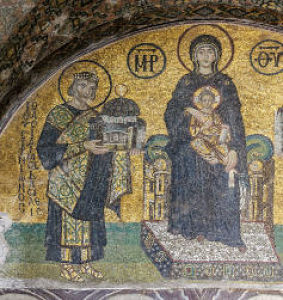301. The Empire Strikes Back: Introduction to Byzantine Philosophy
We begin to look at the third tradition of medieval philosophy, in which the heritage of classical antiquity is preserved and debated by the Byzantines.
Themes:
• P. Golitsis, 2011, “Is Philosophy in Byzantium Anti-Byzantine?”, Deukalion 28 (2011), 50-74.
• D. Gutas and N. Siniossoglou, “Philosophy and ‘Byzantine Philosophy,’” in A. Kaldellis and N. Siniossoglou (eds), The Cambridge Intellectual History of Byzantium (Cambridge: 2017), 271-95.
• G. Kapriev, “Gibt es eine byzantinische Philosophie?” Ostkirchliche Studien 51 (2001), 3-28.
• G. Kapriev, “The Modern Study of Byzantine Philosophy,” Bulletin de Philosophie Médiévale 48 (2006), 1-13.
• M. Trizio, “Byzantine Philosophy as a Contemporary Historiographical Project,” Recherches de Théologie et Philosophie Médiévales 74 (2007), 247-94.






Comments
Praise for series
A superb introductory episode and a wonderful defense of an expanded view of the history of philosophy. I am so glad that you will be look at other cultures such as the Syriac.
In reply to Praise for series by Paschal Scotti
Praise
Thanks! Glad (and relieved) that the first reaction is a positive one. As I mention at the end we will already get into those other cultures starting in the next episode.
Exciting!
I feel like I know less about this tradition than anything else you've covered in the series, so I'm really looking forward to it!
Theme Music
I greatly admiire your project. It is for the ages.
I know it's nitpicking. But why do you make your intro and ending music so loud in comparison to the volume of your Commentary? I think it was balanced for the "Classical" section, but since then....not so good. I love listening to your podcasts several times each. And it's no criticism for me to say it sometimes lulls me to sleep. And then the loud ending crushes my brain every time.
Anyway, keep up the great work....apart from the music volume.
In reply to Theme Music by ozzy
Intro music
Hm... that might be a weird technical issue since I think that the episodes are filtered to even out volume before we finalize them. Are you finding it a problem with the new Byzantine episode and the Africana ones? If so I'll ask my production assistant to tone it down a bit.
In reply to Intro music by Peter Adamson
Music issue
Only the "classical" episodes have the music/commentary volume in balance on my laptop. For the others, there is quite an imbalance. Maybe I'm the only one who likes to go into dream land via your podcasts. I appreciate their soporific qualities and notice because they rudely wake me up at their end. ( I have listened to the classical episodes a lot! )Thanks!
In reply to Music issue by ozzy
Music
OK, thanks. I guess probably the transition from my voice to the music is always going to be jarring enough to wake you up even if we turn it down, but I will look into this.
Finally! I've been waiting
Finally! I've been waiting for the Byzantine part since the Mediaval series started. Its the one I know the least about and can't wait to learn more. Thank you for this podcast and your work!
I think you should mention
I think you should mention also the Slavic tradition, although there wasn't perhaps a distinct philosophical leaning apart from the theological.
After all Cyril, the creator (with his brother Methodius) of the first Slavic alphabet - the Glagolitic script - was named Cyril the Philosopher. His disciples were welcomed in the First Bulgarian Tsardom introducing the Cyrillic script and initiating the foremost translations and commentaries of patristic texts in Slavic language.
In reply to I think you should mention by Hristo
Slavs
Yes, I thought about that and whether to explain the invention of Cyrillic, if only because it is important and interesting and everyone should know about it. Maybe I can fit it in later like when I do an episode on Greek manuscripts.
Thanks
Dear Peter,
thank you very much. I've been waiting for this series for so long. Actually since you tackled thinkers of late antiquity. By the way, I always enjoy your subtle humour and pleasant voice. My only wish would be that if you present new philosophic ideas or twists that you slow down your voice a little bit to allow us non-expert listeners an easier grasp on them. My mind takes a moment to grasp a concept before moving on to the next.
In reply to Thanks by Johannes
The need for speed
Thanks, glad you like the series! Actually if you listen to the early episodes you'll find that I have slowed down a lot and I do often try to slow it down when I get to a more technical bit, but I will try to bear this in mind even more than I have been.
Notes on the history
Well, I wouldn't go as far as saying that without the Byzantines we would be speaking Arabic, since the Franks independently defeated an attempted Islamic invasion on their own. And of course later the Franks were so secure in their homeland that they could afford to travel across the known world to come to the aid of the Byzantines.
I'd be interested in hearing more about the theory that stereotypes about Byzantium originate from Crusaders trying to justify the sack of Constantinople though. I've seen the Byzantines already being previously stereotyped as soft or effeminate both by Franks and by Muslims, but it seemed to me that most of the stereotypes relating to complex bureaucracy and also absolute imperial power and religious fanaticism date back to the high point of historical revisionism that was the Enlightenment, when writers were fabricating an exaggerated image of Byzantium as a way to criticise their own societies. In fact the Italian Crusaders who sacked Constantinople felt quite justified in their actions, given the deterioration of East-West relations since the Massacre of the Latins 20 years earlier, in which the Byzantines murdered almost the entire Catholic community of Constantinople and sold the few survivors into slavery to the Muslims. I think that was already quite ample justification for what followed.
In reply to Notes on the history by Zarl
Byzantine history
Well, I'm not a real historian, only one of philosophy, but re. the first point I think if we are going to indulge in counterfactual speculation, it's plausible the Muslims would have taken the rest of Europe if Constantinople had fallen early on. If you imagine the size of their territory and look at the speed of their conquests, and then add the resources of Byzantium's territory to the resources they did possess, I don't see the Franks turning that back. The best argument against it would actually be that the Islamic forces weren't necessarily interested in conquering the rest of Europe. There is an interesting episode of In Our Time from the BBC a while back about the Battle of Tours and on that the guest academics argued that this wasn't really the Franks stopping an Islamic invasion, because no such invasion was planned. Still I think if Constantinople falls then it is a straight shot into central Europe, much easier than coming around through Iberia, and I wonder if they mightn't have pressed on. Of course we'll never know!
Re. the post 1204 propaganda, Judith Herrin has written on that and I really got the idea from reading her. I think that, despite various points of contention prior to 1204, a lot of Westerners were genuinely shocked by the event (which was obviously not a stated goal of the 4th Crusade) and that it did seem to need some rationalization.
In reply to Byzantine history by Peter Adamson
Tours and the strange involuntary invasion
Of course counterfactual history is always an exercise in futility, especially if you credit the idea of the butterfly effect. For all we know, without Byzantium Europe woud now be under the merciless rule of the Tibetan-Luxembourgish Commonwealth. But looking at history, the main problem that large pre-industrial empires face is overextension. Conquering Anatolia and Greece, let alone all of Southeastern Europe, would actually have made the Caliphate less likely to be able to expand further, rather than more likely.
About Tours, I know about the nowadays fashionable view that the battle was of no importance after all, or even that the Muslims weren't really interested in invading Europe. If that is true, you really have to wonder what the conquest of Iberia, the repeated invasions of Gaul, and the conquest and occupation of cities such as Nîmes, Arles, Béziers, Aix-en-Provence, and Avignon were all about. Or how exactly they found their way to Tours, which is twice as close to Paris as it is to Spain, with an army twice as large as the one that 20 years earlier sailed across the strait of Gibraltar and conquered Iberia, and commanded by the governor of Al-Andalus himself, who by the way was killed in the battle. Beyond that, the battle is significant as the high water mark of the Muslim expansion in the West, and marks the beginning of first the Carolingians pushing them back over the Pyrenees, followed by the long and arduous process of Reconquista in Spain. But it was only one of many battles, for instance the aforementioned governor's son attempted a new invasion a couple of years later, prompting a new expedition by Charles Martel in which he reclaimed parts of Provence that had been occupied for over a decade. In any case, even assuming that all of this conquering was done without any thoughts of conquest in mind, it's difficult to see how the Muslims would have been more enticed into success by having to battle through all of Eastern and Central Europe to get to Gaul, rather than starting from the territories they were already occupying in, well, Gaul.
Add new comment